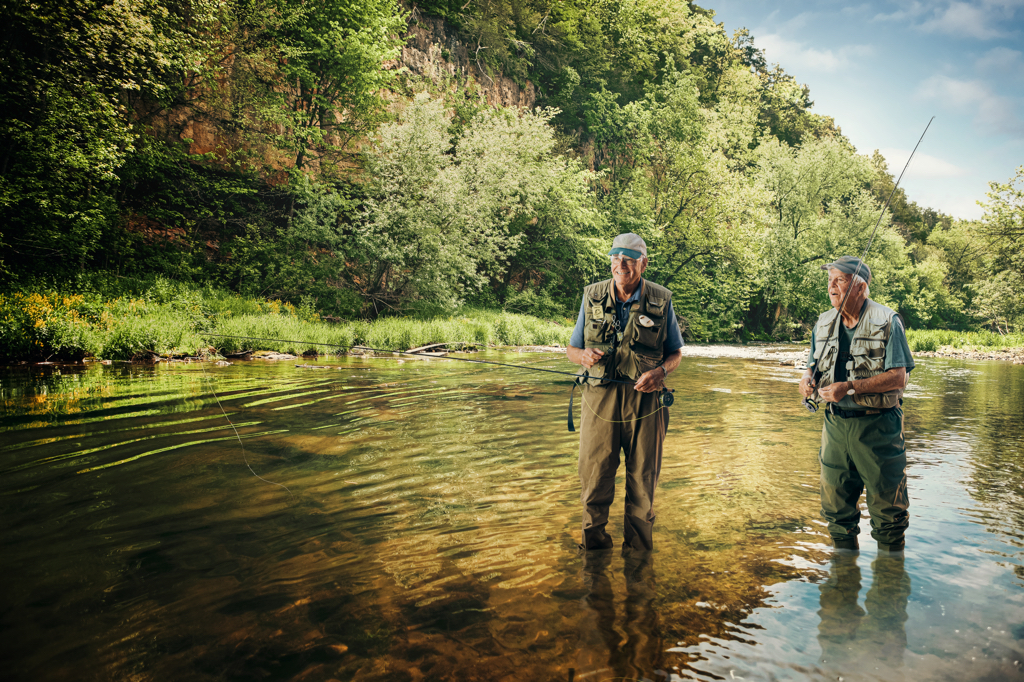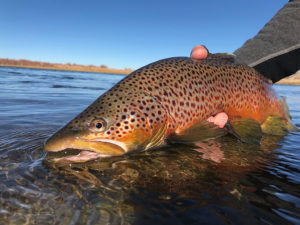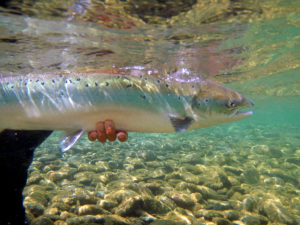Making Great Memories in the Great Outdoors
Fly fishing is the perfect pastime, connecting humans with nature
Picture this:
The sun is shining, the sky is blue, you’re surrounded by tall trees, and you can hear birds chirping along with the calming sound of a nearby stream.
If this scenario sounds relaxing and meditative, you might want to take up fly fishing. It’s one part sport, one part skill, and one part connecting with nature. Tom O’Rourke and Tom Lloyd, friends and neighbors at The Hill at Whitemarsh, both describe fly fishing as a constant in their lives.
“I grew up not far from here in Laverock, and there was a pond near my house. I learned how to fly cast there before going to camp the summer that I turned ten,” recalls Mr. Lloyd. “At the camp, I caught trout and learned how to tie trout flies. I was hooked, and have been fly fishing for the last 70 years.”
Mr. O’Rourke also grew up near the water in Bellport, Long Island, and started fishing at a young age. It wasn’t until he was out of college, however, that he expanded his hobby with fly fishing.
“I was given a bamboo rod by a friend in 1962 and played around with it, fly fishing occasionally for about ten years. After that, I really got into it, and in the last 30 or so years it’s become a real passion of mine,” says Mr. O’Rourke.
A Sport of Knowledge, Skill and Stillness
 Mr. O’Rourke reports that fly fishing is a very cerebral endeavor because it requires you to put a lot of thought into all aspects of catching a fish.
Mr. O’Rourke reports that fly fishing is a very cerebral endeavor because it requires you to put a lot of thought into all aspects of catching a fish.
“You have to be able to read the water, to understand what the fish in that water are most likely to eat at that time of day, and to match the fish you’re trying to catch with the local insect they’re most likely to eat,” says Mr. O’Rourke. “To become a skilled fly fisherman you have to have a deep knowledge of insects and their life cycles. You’re constantly learning throughout the process, which is also part of the appeal.”
For Mr. Lloyd, however, his love of fly fishing is less about the knowledge of insects and more about having the ability to be surrounded by nature. Mr. Lloyd, who ran an environmental consulting group before his retirement, was a biologist by trade and loves feeling connected with nature through fly fishing.
“When I began my career in biology in the late fifties, the state of our public waterways was in bad shape,” Mr. Lloyd says. “In my lifetime, the changes that have occurred in the water [in the Philadelphia area] are amazing. I love being out in nature — the sound of the water and the smell of the trees — there’s a therapeutic component to it. You have to remain very focused and stay very much in the moment. There’s nothing like it.”
Fly Fishing Around the Globe
Mr. Lloyd has had opportunities to fly fish in fresh and salt water in North and South America and in Europe. One of the most unique trips for him was to Russia in 1990 when the Soviet Union was first opened up to foreigners.
“A classmate of mine planned a fishing trip to the Kola Peninsula in the far north along the Umba River,” Mr. Lloyd recalls. “It was very primitive. We lived in a 5,000-gallon oil tank that had been converted to a living space. A door and a window were cut out of the tank and some bunks were welded onto the side, but it was fun and we caught lots of Atlantic salmon.”
Mr. Lloyd’s fly fishing expeditions have also led him to the Caribbean and New England for saltwater species and to Canada for salmon and trout. Each destination has been unique and the fishing experience different. Mr. O’Rourke has also traveled quite a bit as a result of his passion for fly fishing; he has spent time in Montana, Wyoming, and Utah, as well as Argentina, where he was able to fly fish in the Patagonia region.
“It is a really spectacular part of the world,” says Mr. O’Rourke. “And although it’s not as exotic, we have a place in Maine and I love to fish there as well. There is a tremendous trout stream up there, and I try to put a fly on the water about 125 days a year.”
Exploring the Streams Close to Home
 Mr. O’Rourke and Mr. Lloyd have been fly fishing together for years, and although they haven’t been able to travel as much due to the pandemic, they’ve been making the best of it and finding ways to stay closer to their homes at The Hill and still get out on the water.
Mr. O’Rourke and Mr. Lloyd have been fly fishing together for years, and although they haven’t been able to travel as much due to the pandemic, they’ve been making the best of it and finding ways to stay closer to their homes at The Hill and still get out on the water.
“We’ve gone up to the Poconos a few times to go fly fishing,” says O’Rourke. “It’s still a great experience and although we drive up there separately, we can socialize a bit once we’re out on the water.”
“Many people think that it’s a solo activity, but fly fishing is a social experience,” says Mr. Lloyd. “It might be an individual sport but it can be a group activity and there is often an opportunity at the end of the day to tell stories about the fish you missed.”
Mr. Lloyd sometimes goes down to the Wissahickon — which is just a few minutes’ drive from his home at The Hill — to go fishing just as he had as a little boy.
“When I was 11 and 12 and the trout season had opened, my mother would pick me up from school and drive me down to the Old Red Covered Bridge across the Wissahickon in a 1948 Oldsmobile station wagon. We bounced down Thomas Mill Road, which is now only a foot trail, where I’d set up and fish,” Mr. Lloyd says wistfully. “Fishing is great because it gives you the opportunity to capture fish, but also memories of the places and people you are with.”
Talking to me from his home office, Mr. Lloyd takes a moment to point out the framed brown trout hanging behind him over his office door.
“I caught it with my parents in 1952 or 53. I was so proud then. And now I have gotten to teach my grandchildren how to fish. It’s allowed me to collect many wonderful memories.”